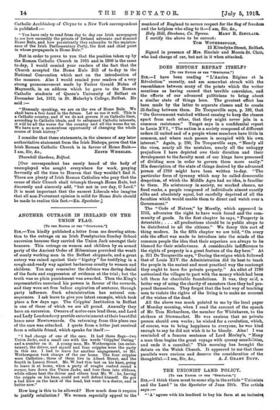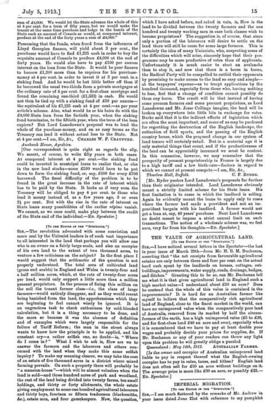THE UNIONIST LAND POLICY.
[To THE EDITOR CY THE "SPECTATOR...] SIR,-1 think there must be some slip in the article "Unionists and the Land" in the Spectator of June 2Sth. The article says :- "' A' agrees with his landlord to buy his farm at an inclusivek sum of £4,000. Wo would lot the State advance the whole of this at 4 per cent. for a term of fifty years, but we would make the tenant at the same time purchase and lodge in the hands of the State such an amount of Consols as would, at compound interest, produce at the end of the forty years a sum of £4,000."
Presuming that the funds, when freed from the influences of Lloyd Georgian finance, will yield about 3 per cent., the purchaser would have to find £1,225 cash in order to buy the
requisite amount of Consols to produce £4,000 at the end of forty years. He would also have to pay £160 per annum interest on the loan from the State. It would be poor finance to borrow £1,200 more than he requires for his purchase- money at 4 per cent. in order to invest it at 3 per cent. in a sinking fund. And he would be but little better off than if he borrowed the usual two-thirds from a private mortgagee at the ordinary rate of 4 per cent. for a first-class mortgage and found the remaining one-third (£1,333) in cash. He would
not then be tied up with a sinking fund of £50 per annum—
the equivalent of his £1,225 cash at 4 per cent.—as per your article's scheme. Also, what would he or his heirs do with the £4,000 State loan from the fortieth year, when the sinking fund terminates, to the fiftieth year, when the term of the loan
expires ? But Lord Lansdowne's proposal was to lend the whole of the purchase-money, and on as easy terms as the Treasury can lend it without actual loss to the State. Not at 4 per cent.—I am, Sir, &I., CHARLES W. F. CRAIIPURD.
Annbank House, Ayrshire.
[Our correspondent is quite right as regards the slip. We meant, of course, to write fifty years in both cases. At compound interest at 4 per cent.—the sinking fund could be invested in municipal loans to realize that, or else in the new land stocks—some £590 would have to be put down to form the sinking fund, or, say, £100 for every £700 borrowed. The fiscal difficulty of the problem is to be found in the great increase in the rate of interest which has to be paid by the State. It looks as if very soon the Treasury will be obliged to pay 4 per cent. to those who lend it money instead of, as a few years ago, 3 or even 24 per cent.. But with the rise in the rate of interest on State loans many possibilities of the earlier regime vanish.
We cannot, as we once could, make play between the credit of the State and of the individual.—ED. Spectator.]



















































 Previous page
Previous page